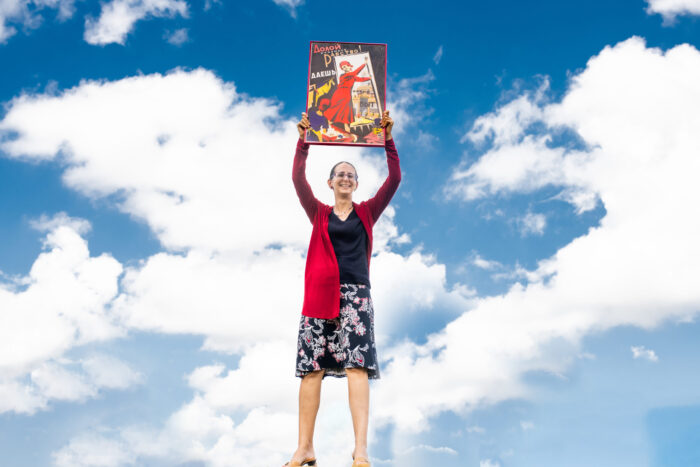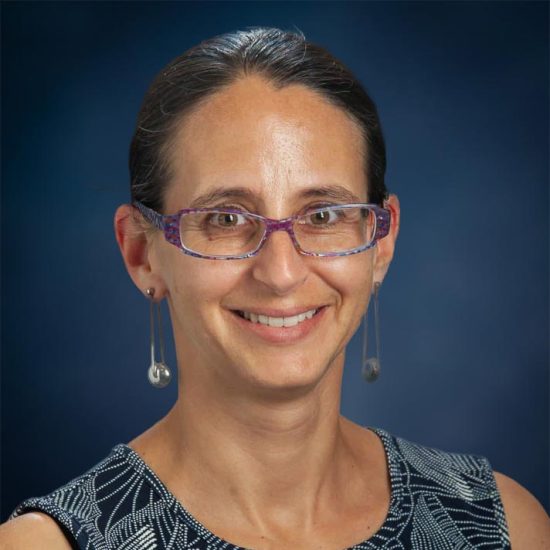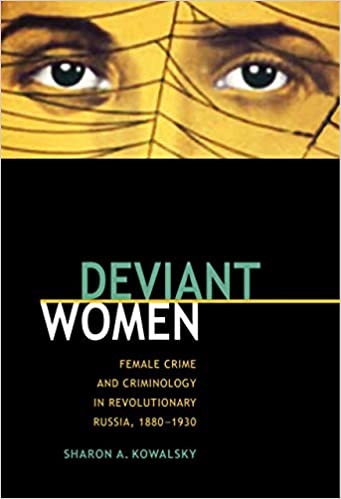
Words are important, words have meaning and impact, and the way that we craft the stories of our past can fundamentally influence the present and the future.
Sharon Kowalsky, Ph.D. Department Head, Gender Studies Coordinator and Associate Professor of History
- Faculty

When Sharon Kowalsky entered college as a science major, the only course she knew she wanted to take was Russian. She had taken a literature class in high school and wanted to continue by learning the language too. Kowalsky quickly abandoned science and became a History major, with a double major in Russian. She wrote an honors thesis on the relationship between the Soviet state and the Russian Orthodox Church, but she began to be interested in Women's History. After college, Kowalsky moved to Moscow and found a job as a secretary for a British law firm. She worked in Moscow for two years, improving her Russian skills, and she even learned to touch-type in Russian. Returning to the US, Kowalsky enrolled in the History graduate program at the University of North Carolina at Chapel Hill. She knew she wanted to be a historian of early Soviet Russia and to focus on women, but she was not sure exactly what she wanted to study. Kowalsky’s adviser suggested that she begin to explore the topic of female criminality. The examination of women's deviance in the Russian Revolutionary period led Kowalsky through her first book, and it continues to orient her research and teaching to this day.
A Conversation with Dr. Kowalsky
What draws you to your discipline?
“I have always liked to read. While I enjoy a wide variety of fiction in my spare time, I find greater satisfaction in my work from the fact-based analysis that history provides. Historians sort through the multitude of perspectives in the past to help us better assess and engage with contemporary society. As a researcher, I love delving into the minute details of peoples' experiences that make up the building blocks of historical understanding. As a writer, I find satisfaction in taking those small pieces and creating an overarching whole, a compelling argument that not only speaks to past experiences but also informs the present. Words are important, words have meaning and impact, and the way that we craft the stories of our past can fundamentally influence the present and the future. One of the exciting developments in the historical profession right now is the emergence of various perspectives of the past. These alternative perspectives make our understanding of the past messier and more complicated, but at the same time bring more people into an increasingly complex narrative that more accurately reflects the greater possibility of belonging.”
What has been your favorite course to teach?
“My favorite courses have varied over time. When I started at TAMUC, my first semester I had to teach a course on the French Revolution and I absolutely hated it. Now, the French Revolution is one of my favorite parts of my upper-level Europe survey to teach. It’s great to teach material that I know really well, for instance when I teach classes on Russia and the Soviet Union or on revolutions, but I also really enjoy teaching the classes I am less comfortable with because they challenge me to articulate a compelling narrative and push me to learn new things. For that reason, I also really enjoy teaching the US History survey. It is not my field of expertise, and I don't know as much about the topic as some of my colleagues, but the material is so much more directly relevant to students' lives that it is easier and more rewarding to make those connections between the past and the present. Not long ago, I taught a course for graduate students on Women and Work, where we covered everything from Early Modern Europe to the contemporary United States. I knew some of the materials, but I learned so much more. That is the really exciting part about my job—I am always learning new things and making new connections.”
Tell us about a project you are currently working on or recently completed.

“I have been working on a study of interpersonal violence during the Russian Revolutionary period that builds from my previous work on female criminality. Russia experienced what could be called a continuum of violence during the early twentieth century. Multiple wars and revolutions resulted in widespread experiences of violent behavior, both from the state and from individuals. My interest is how this broad context of violence translated into personal behavior, and how the widespread violence of the time shaped personal relationships. Specifically, I am looking at domestic violence broadly construed, seeking to understand its prevalence but also how the nascent Soviet state dealt with such deviant behaviors as it sought to reshape fundamentally the ways that people interacted with each other. In general, I'm fascinated by the revolutionary turn, by how the acceptability of certain behaviors changes in different contexts. My sense is that we still do not completely understand the dynamics of the revolution; there are so many questions yet to answer and so many different ways to approach them.”
Tell us a bit about yourself
“I grew up in northern Michigan in a very small town in the middle of the woods. In college, my roommate from New York City used to joke that more people lived in her apartment building than in my entire town. My parents are both musicians and I chose to play the viola. While I focused on the viola in high school, I knew that wasn't what I wanted to do with my life (I really did not like to practice), but being a good violist has served me well beyond school. I have played in community orchestras everywhere I have lived, and being an amateur musician has broadened my horizons.”
Educational Background
- Ph.D., University of North Carolina at Chapel Hill, History, 2004
- M.A., University of North Carolina at Chapel Hill, History, 1998
- B.A., Washington University in St Louis, History and Russian, 1994
Academic Positions
- Department Head, History Department, Texas A&M University-Commerce, 2018-Present
- Director of Gender Studies, TAMUC, 2016-Present
- Associate Professor, History, TAMUC, 2012-Present
- Assistant Professor, History, TAMUC, 2006-2012
- Lecturer, History, University of North Carolina at Chapel Hill, 2005-2006
- Visiting Assistant Professor, History, Georgetown University, 2004-2005
Awards and Honors
- Aleksanteri Institute of the University of Helsinki, Visiting Fellow, Summer 2019
- Southern Conference on Slavic Studies Best Book Prize, 2012
Research Interests
- Russian and Soviet History
- Women's and Gender History
- History of Crime and Deviance
Professional Organizations
- American Historical Association
- Association for Slavic, East European, and Eurasian Studies
- Association for Women in Slavic Studies
- Southern Conference on Slavic Studies
- Coordinating Council for Women in History
- European History Section of the Southern Historical Association
- Social Science History Association
- Southern Association of Women in History
Featured Courses
HIST 337 Europe in the Age of Enlightenment and Revolution
HIST 338 Modern Europe, 1848-1991
HIST 436 Russia and the Soviet Union from Peter to Putin
HIST 473 Women and Gender in European History
HIST 544 Readings in Modern European History
HIST 572 Themes in Gender and Sexuality History
HIST 573 Themes in Revolution History


